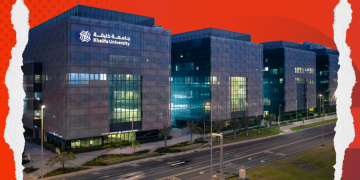Saudi Arabia now leads the world in cybersecurity. The Kingdom earned first place in the 2025 World Competitiveness Yearbook cybersecurity rankings, maintaining its top spot for the second consecutive year.
This achievement puts Saudi Arabia ahead of traditional tech powerhouses like the United States, Singapore, and South Korea, countries that have dominated digital security for decades.
Just over a decade ago, Saudi Arabia faced one of the most damaging cyber attacks in history when hackers destroyed 30,000 computers at Saudi Aramco in 2012. Today, the same country teaches others how to protect their digital assets.
Vision 2030 Drives Cybersecurity Success
Saudi Arabia’s cybersecurity leadership stems directly from its Vision 2030 program. The national strategy recognized early that digital transformation without strong security would fail.
The Kingdom invested heavily in building cybersecurity from the ground up. It created the National Cybersecurity Authority (NCA) in 2017 as the central command for all digital defense activities.
The NCA’s achievements tell the success story. The authority conducted over 2,400 cyber assessments, trained more than 1,200 specialists, and responded to over 1,800 cyber incidents. These numbers show systematic preparation rather than reactive responses.
“Saudi Arabia has achieved fourth place globally in the digital services index, first regionally, and second among G20 nations,” said Samer Omar, cybersecurity and digital trust leader at PwC Middle East. “The rapid advance in technology has increased the digital ecosystem in Saudi Arabia, which in turn has further increased its exposure to cyber-attacks.”
Saudi Arabia Earns Tier 1 Global Recognition
The United Nations International Telecommunication Union designated Saudi Arabia as a Tier 1 “role-modeling” nation in the Global Cybersecurity Index 2024. This classification places the Kingdom among countries that other nations should study and copy.
The UN recognition validates Saudi Arabia’s comprehensive approach. The Kingdom didn’t just buy expensive cybersecurity tools. It built an entire ecosystem that includes education, training, regulation, and international cooperation.
Saudi Arabia now hosts the Arab Cybersecurity Ministers Council headquarters in Riyadh. The Kingdom also organized the Global Cybersecurity Forum, which brought together representatives from over 125 countries.
Economic Impact Reaches 13.3 Billion Saudi Riyals
Saudi Arabia’s cybersecurity sector now contributes 13.3 billion Saudi Riyals to the economy. The sector accounts for 0.39% of overall GDP and 0.81% of non-oil GDP, showing meaningful economic diversification.
The market splits between public sector spending (31%) and private sector investment (69%). This balance shows both government commitment and business confidence in cybersecurity investments.
Industry analysts project the cybersecurity sector will grow 11-13% annually. This growth rate exceeds most traditional industries and demonstrates the sector’s economic potential.
Building Cybersecurity Talent Pipeline
Saudi Arabia addresses the global cybersecurity skills shortage through systematic talent development. The Kingdom now has 19,600 cybersecurity professionals, with women making up 32% of the workforce.
The National Cybersecurity Academy provides advanced training programs. Universities across the Kingdom offer cybersecurity education, including Capture The Flag competitions that test practical skills.
The government also requires all cybersecurity positions in organizations to be filled by qualified Saudi professionals under the updated Essential Cybersecurity Controls (ECC-2) framework.
Over 348,000 people participated in cybersecurity awareness programs. The Kingdom conducted boot camps in Riyadh, Jeddah, and Khobar, training more than 330 professionals in intensive programs.
Critical Infrastructure Protection Strategy
Saudi Arabia learned from the 2012 Shamoon attack that targeted Saudi Aramco. The incident destroyed thousands of computers and highlighted vulnerabilities in critical infrastructure.
The Kingdom now operates comprehensive Critical Information Infrastructure Protection programs. These initiatives secure vital sectors including energy, finance, transportation, and healthcare.
“Saudi corporations are progressively implementing sophisticated risk assessment tools and methodologies to quantify the economic impact of cyber threats,” said Sohil Mohamed, director of cyber risk advisory at Alvarez & Marsal.
The Kingdom registered over 400 cybersecurity service providers and conducted more than 100 cybersecurity drills. These exercises test response capabilities and identify weaknesses before real attacks occur.
International Cybersecurity Leadership
Saudi Arabia exports cybersecurity expertise to other countries. The National Cybersecurity Authority collaborates with international organizations and shares best practices globally.
The Kingdom contributed to developing an international convention on combating cybercrime. Saudi officials participate in major cybersecurity conferences worldwide, sharing lessons learned from the Kingdom’s digital transformation.
“By leveraging its robust cybersecurity frameworks and strategic partnerships, Saudi Arabia can offer tailored cybersecurity services and solutions to other regions,” Mohamed explained.
The Kingdom’s strategic location in the Middle East makes it a natural hub for regional cybersecurity cooperation. Saudi Arabia chairs the Arab Cybersecurity Ministers Council and leads regional initiatives.
Technology Innovation and Research
Saudi Arabia launched the National Program for Research, Development, and Innovation in Cybersecurity. This initiative develops homegrown solutions rather than relying solely on foreign technology.
The Cybersecurity Accelerator empowered nine startups in the cybersecurity sector. These companies develop innovative solutions for both domestic and international markets.
The Kingdom also established the second phase of the “CyberIC” program, which benefited over 13,000 participants. This program focuses on building practical cybersecurity skills through hands-on training.
Saudi Arabia’s cybersecurity strategy emphasizes practical implementation over theoretical knowledge. The approach produces professionals who can handle real-world cyber threats effectively.
Future Growth and Global Impact
Saudi Arabia’s cybersecurity market is projected to grow from $2.6 billion in 2024 to $7.5 billion by 2033. This growth represents one of the fastest-expanding cybersecurity markets globally.
The Kingdom’s success provides a template for other developing nations. Saudi Arabia shows that strategic planning, systematic investment, and comprehensive approach can achieve cybersecurity leadership quickly.
Vision 2030 continues driving cybersecurity innovation. The program ensures cybersecurity remains integrated with economic diversification rather than treated as a separate concern.
Saudi Arabia’s transformation from cyber attack victim to global cybersecurity leader demonstrates that countries can build world-class digital defenses through smart strategy and sustained commitment.














